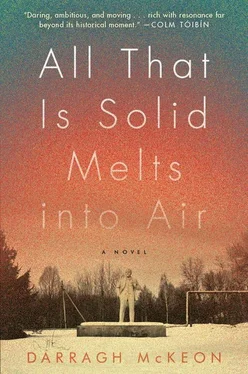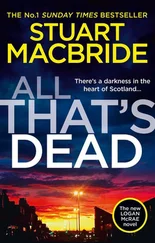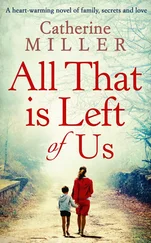“Anyone know him?” he asked his workmates.
Shakes of the head.
“Okay. We’ll find you someone who does.”
He indicated for Artyom to sit in the cab, and the rest of the men returned to their platforms and grabbed their respective handles. They drove through the streets, low-hanging branches scraping the windshield. The driver had a knob on the steering wheel, which he used to drive the thing one-handed, grinding it around corners, driving so close to lampposts and walls that Artyom was sure they were going to crash, until he flicked the wheel in the right direction and the truck spun around miraculously on its own axis.
They left the city and, after a few minutes, turned off into a narrow side road arched with trees. They stopped at a barrier, where the driver flashed a card to a man in the booth, and they edged down a slope and onto a concrete platform.
Gulls dropped down from the sky and skimmed over a vast synthetic territory, a seascape that was entirely made up of things discarded. Bulbous plastic bags, strings of electrical cable, and soggy cardboard were congealed into a single, amorphous mass. Bulldozers surfed the waves of slosh, surging uncertainly against the semisolid waste. They looked as if they could tip over at any moment, but they climbed steadfastly before plunging back once more into the expanse.
The man from the back of the truck walked forward to a tin shed twenty metres away. Artyom sat in silence in the cab, the driver barely looking at him—not out of spite or revulsion, Artyom sensed, he was just a man who didn’t feel a need to make a connection, who was happy in his own thoughts. The man emerged from the shed and beckoned him with a wave, and Artyom opened the cab door and the air slithered into his nostrils, leaving a filmy residue against the back of his throat. He had never smelled anything like it. He clasped his hand to his nose and breathed only into the cupped space of his palm. As he stepped out onto the ground, a grey, cloacal muck encased his shoes. It was a struggle even to walk in this place.
“I asked around. He’s due back in a couple of minutes. You can wait here.”
“Thanks.”
“And you. Thanks for your help.”
They shook hands and the man climbed back on the truck. Artyom watched as it rounded one of the mounds and backed up against a low concrete wall, and spat out its chewed-up contents. The men stood around and shared a cigarette and talked amongst themselves, and when their truck was emptied they stood at their positions once more and drove up the laneway, back into the morning, into fresh air.
Artyom stood and watched, captivated, his hand still in front of his face, and took shallow breaths through his mouth. The graveyard of all that was once useful. It was all a kind of greyish brown, an anonymous sight. After a few minutes of looking, he was shocked to realize that there were some people moving through the rubbish, covered in this sludge, barely distinguishable from their surroundings. They walked with sacks slung over their shoulders and picked things up and examined them, turning them over in their hands. What a way of life. Rising every morning to scavenge around this hollow, barren terrain. This was not a place Artyom could ever have imagined, a place so man-made. He looked out at these people wading through filth, letting out a bleat of delight if they salvaged something they could sell, finding small traces of encouragement buried in all the desolation, their comrades running towards them to share in the excitement. And Artyom would return frequently to this moment in the following weeks, when he watched sickness engulf his father, when blood seeped out through the pores of his father’s skin, when he began to realize that he could never understand or predict the pathways that someone’s life could take; that the will of a desperate person was stronger than anything he knew and that fate unspools in its own stubborn way, beyond influence or rationale.
Maksim arrived and greeted him, full of consideration, and fed him and took him back to the shelter, returning three days later, having located his father in one of the hospitals. Maksim waited at the gate while they washed as well as they could and dressed in the best clothes they had brought with them. As they got in the car, she looked at her children and said, “Don’t we look well?” and smiled. It had been a month since Artyom had seen his mother smile. He found the sight so reassuring, as comforting as a fire on a winter’s afternoon.
At the front door of the hospital they used the last gold tooth to bribe their way into the building.
There was nobody else there. The place was wrapped in silence. The only sounds were the echoes of footsteps that rang through the corridors. It was disconcerting to see a public building so empty. A shrill silence. Their ears attuned to the constant turmoil of the shelter. Sofya said, “I think my ears are going to crack,” and Artyom knew what she meant.
Once the attendant had given assurances that he would take them to Artyom’s father, Maksim said his good-byes and wished them luck. He slipped some money into Artyom’s mother’s hand, but she refused to take it. They struggled for a few moments, grasping each other’s wrists, and Maksim kept saying, “Please,” even though he was the one leaving the money and, eventually, Artyom’s mother relented. He left them his phone number. “Please. You’ve no one to look after you. If you need help, I’ll help,” and walked out the door. Each one of them called out their thanks, but he batted it away, kept his head down.
In the corridor on the third floor the attendant introduced them to the nurse. She took Artyom’s mother aside and spoke to her quietly. As their conversation continued, Artyom watched his mother edge away from her, palms raised, as if she had just walked into the cage of a wild animal.
He heard the woman say, “His skull is compromised.”
He heard the woman say, “His central nervous system is compromised.”
Sofya heard it too.
Artyom asked Sofya, “Compromised from what?”
Sofya wouldn’t reply.
Compromise. Isn’t that something you do when you can’t agree? How can a skull be compromised?
They walked into the room, and everything was much better than Artyom expected it to be. His father was sitting on the bed, playing cards with men they knew: some of their neighbours—Yuri Polovinkin, Gennady Karbalevich, Eduard Demenev. It was surreal to see them all sitting here, as if they were at home, chatting after a meal, whiling away the hours before sleep.
Artyom’s father looked up and saw them enter, and Artyom noticed his eyes flare, his pupils expand. He thought his father might drop the cards in his hand, his muscles going slack with surprise.
He turned to the other men. “I’m in trouble now.”
The men laughed.
He embraced each of them, wrapping his arms around them, pressing their bodies into his. And even though the nurse advised against it, they didn’t hesitate to touch him. How could they? And Artyom’s mother didn’t scold. But when they turned around and faced the other men, there was an odd force in the air, a wariness. They didn’t volunteer to come forward, they just nodded. The men, for their part, stayed withdrawn.
Artyom’s father was wearing pajamas that were too small for him; they rode up his arms and legs, clung to his chest. It made him look like a small boy who had grown magically overnight.
IN THE STERILIZING ROOM, Grigory stands in front of the sink, surgical hat tied in a knot at the back of his head, goggles and thyroid collar on, and cleans under his nails with a plastic disposable pick. He has long, deft fingers, disproportionate to his short palm. When he’s satisfied, he takes the scrub to his hands, lather forming around his knuckles. Five, six operations a day and still he feels the absence of his wedding ring, nothing to place on the steel shelf in front of him; instead it lies abandoned in the upper drawer of his bedside locker, back there in his city. He works the tap with his elbows and rinses his hands, seeing the skin emerge sleek from under the foam and backs into the operating room, holding his hands up, palms facing him, the nurse helping him to slip on the gown and gloves.
Читать дальше












